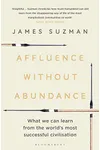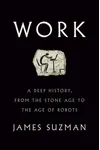Picture a South African anthropologist who swapped lecture halls for the Kalahari Desert, weaving ancient wisdom into modern debates about work and wealth—meet James Suzman! With a knack for blending rigorous research with captivating storytelling, Suzman has spent decades exploring humanity’s oldest cultures, challenging how we view our daily grind. His books, like Affluence Without Abundance and Work: A Deep History, from the Stone Age to the Age of Robots, invite us to rethink what it means to live well.
The Making of James Suzman
Born in Johannesburg, South Africa, James Suzman grew up with a curiosity about cultures and human behavior. Educated at Michaelhouse, he pursued social anthropology, earning an MA (Hons) from the University of St Andrews in 1993 and a PhD from the University of Edinburgh in 1996. His passion led him to Botswana’s eastern Kalahari in 1991, where he began studying the Ju/’hoansi San, one of the world’s last hunter-gatherer societies. This immersion shaped his career, blending fieldwork with a mission to amplify marginalized voices.
James Suzman’s Unforgettable Stories
Suzman’s writing stands out for its vivid narratives and deep insights into human history. His first major book, Affluence Without Abundance: The Disappearing World of the Bushmen (2017), paints an intimate portrait of the Ju/’hoansi, showing how their ‘work less, live more’ philosophy contrasts with modern hustle culture. Critics, like Yuval Noah Harari, praised its blend of ethnography and evolutionary lessons. In 2020, Suzman released Work: A Deep History, from the Stone Age to the Age of Robots, a sweeping exploration of work’s evolution from single-celled organisms to AI-driven economies. Drawing from anthropology, biology, and physics, it challenges the idea that humans are hardwired to overwork.
His style is accessible yet profound, weaving personal anecdotes with scientific rigor. Suzman’s focus on hunter-gatherer societies highlights themes of sustainability, equality, and the human need for purpose beyond paychecks. He’s also published widely in outlets like The New York Times, bringing anthropological perspectives to global audiences.
Why James Suzman Matters
Suzman’s work reshapes how we see work, wealth, and well-being. By spotlighting the Ju/’hoansi’s balanced lifestyle, he critiques modern society’s obsession with productivity and growth, urging sustainable alternatives. His influence extends beyond academia—he’s advised on tourism programs for the Hai//om San and tackled issues like the controversial relocation of Gwi and Gana San in Botswana. As director of Anthropos Ltd., Suzman applies anthropology to solve modern problems, making his ideas relevant to policymakers and everyday readers alike. His books spark conversations about a future where work serves humanity, not the other way around.
- Born: Johannesburg, South Africa
- Key Works: Affluence Without Abundance (2017), Work: A Deep History (2020)
- Notable Role: Director of Anthropos Ltd., a think tank for social and economic solutions
Ready to rethink your 9-to-5? Grab Work: A Deep History and dive into James Suzman’s fascinating blend of anthropology and big ideas!

